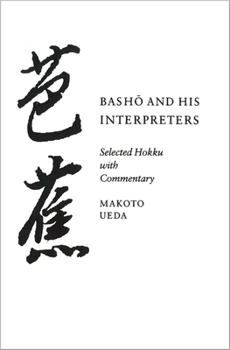Basho and His Interpreters: Selected Hokku with Commentary
Select Format
Select Condition 
Book Overview
This book has a dual purpose. The first is to present in a new English translation 255 representative hokku (or haiku) poems of Matsuo Basho (1644-94), the Japanese poet who is generally considered the most influential figure in the history of the genre. The second is to make available in English a wide spectrum of Japanese critical commentary on the poems over the last three hundred years.
Format:Paperback
Language:English
ISBN:0804725268
ISBN13:9780804725262
Release Date:January 1992
Publisher:Stanford University Press
Length:468 Pages
Weight:1.36 lbs.
Dimensions:1.0" x 6.0" x 9.0"
Customer Reviews
4 ratings
A Unique Perspective
Published by Thriftbooks.com User , 16 years ago
Writing about the great haiku poet Matsuo Basho (1644-1694), in both Japanese and English, is widespread, and translations of his poems and prose works are myriad. In "Basho and His Interpreters," Basho authority Makoto Ueda gives us something new: an anthology of commentary. The book features 255 of Basho's poems, arranged in chronological order and spanning his entire life. After each poem are selections from several Japanese commentators--sometimes just two or three, sometimes five or more for especially important or well-known poems. Commentators range from contemporaries of Basho to modern-day thinkers and writers. Basho has traditionally been revered, and if the book has a weakness it is that the comments on a given poem sometimes blur together as too many cite the same source poem and lavish the same praise. (The pattern is sometimes broken up--for example, by Masaoka Shiki who, writing at the end of the 19th century, felt Basho had been too much loved and sought explicitly to take him down a peg.) More to the point, the best selections of comments reveal the more subtle disputes between interpreters. In regard to one poem ("how solemn!", p. 231), one writer says "The poet's virtuosity here is almost intimidating"; but another states flatly, "This is not a good poem." In another poem (p. 249), commentators debate whether one cicada or several is present. In addition to the commentaries proper, Ueda adds concise surveys of each year of Basho's life, with emphasis on his artistic development and poetic activities. Ueda's writing is lucid, which is reflected in the poems and commentaries: the translations of the haiku, if not daring, are accurate and perfectly useful in the context; the commentaries are also translated into highly readable prose. Taken together, these materials should appeal to a range of readers: those interested in Basho on an academic level will find new points of view (and without the work of sifting through the voluminous body of criticism history has left us), while those new to the poet can learn to appreciate the beauty and scope of both his work and his life. ~
A must for anyone interested in Basho
Published by Thriftbooks.com User , 17 years ago
This is a wonderful book for anyone interested in Basho, haiku, or Japanese literature. Ueda combines Basho's own verse with interpretations by well-known haikai commentators (including Akutagawa, Rohan, Hagiwara, and Abe Jiro etc) and entries from Basho's own travel diaries, in which he describes many of the situations that inspired many of his poems. This is a good introduction for beginners and afficionados alike, for it provides a great deal of background information and a wide scale of interpretations that add depth and connotation to the readers understanding of each verse. The book also includes a glossary of terms as well as a section of short biographies for the commentators.
basho's verse in depth
Published by Thriftbooks.com User , 20 years ago
this book is great as a collection of representative verses by basho, the greatest master in the haikai tradition. i'll just add to the other reviewer's remarks that this book can also be read from cover to cover so you can get a feel for basho's development as a poet. overall, a nice book.
A Good Overview of a Master
Published by Thriftbooks.com User , 24 years ago
This is a great book just to browse at random. The interpretations given after each haiku are an interesting twist. Reading them after letting the haiku soak in is somewhat like sharing the poems with other enthusiasts. Some of them also shed a fascinating light on the circumstances of their composition and Basho's attitudes. And if haiku just makes you scratch your head, the remarks will show you interesting ways of looking at each one. Ueda helpfully adds biographical sketches between sections to put the poems into context and provides the original Japanese and word for word translations, and although I have found better translations of individual poems, his are adequate at least and often elegant. Basho of course is great, and this is the perfect book to linger over when you're in a thoughtful mood.





